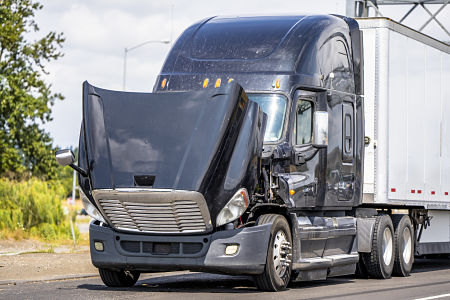Congress considering truck safety as part of overall infrastructure legislation currently in the negotiation phase
Trucking safety is on the agenda in Washington where the Senate, House and White House continue to wrangle over a comprehensive transportation infrastructure bill.
U.S. Sen. Maria Cantwell, chair of the Senate Commerce, Science and Transportation Committee said last week that safety is a top priority.
“We’ve got a lot of congestion and growth and issues,” said Cantwell, D-Wash. “We have some things that are infrastructure investments and there’s some that are just very specific safety.”
Among the bills before her committee is one that would require underride guards on the sides and fronts of all trucks, according to a report in nj.com.
“This bill would finally enact critical, commonsense changes that would save lives on our roads,” said U.S. Sen. Kirsten Gillibrand, D-N.Y., the measure’s chief sponsor. “Requiring effective truck underride guards is one of the best and easiest solutions to prevent horrific underride accidents and protect passengers from being killed when a car collides with a tractor-trailer.”
On a broader scale, the White House and the GOP-controlled Senate continue to negotiate over President Biden’s proposed $2.25 trillion infrastructure bill. The Administration reduced the request to $1.7 trillion, but the two sides remain far apart.
White House press secretary Jen Psaki described the bill’s trimming as mainly being focused on research and development, broadband and funding for bridges, roads, and other major projects “to come closer to the number proposed by the senators.”
Trucking provisions of note tucked in the bill include a program designed to reduce idling and emissions at port facilities. Specifically, it would require the transportation secretary to examine how ports would benefit from electrification, and to study technologies that would reduce emissions from idling trucks. The bill also would propose enhancing severe-weather-resilience strategies as part of a national freight strategic plan, and it would establish a pilot program meant to evaluate a nationwide vehicle-miles-traveled fee.
The Associated Press reported that the cut of research and development funds alone account for $480 billion of the $550 billion total removed from the proposal.
“In our view, this is the act – the art, I should say – of seeking common ground,” Psaki said during a press briefing. “This proposal exhibits a willingness to come down in size, giving on some areas that are important to the president – otherwise they wouldn’t have been in the proposal – while also staying firm in areas that are most vital to rebuilding our infrastructure.”
GOP Sen. Roy Blunt, R-MO, said, “Our biggest gap is defining what infrastructure is. If we get to a definition of infrastructure that the country would have always accepted, that becomes a much narrower space than it appears to be right now.”
The two sides also remain at odds over how the massive proposal will be paid for. Republicans have reportedly floated paying for the package through user fees, such as a gas tax, but Psaki said Biden is “not willing to raise taxes on Americans earning under $400,000” per year through such fees. But Republicans also remain opposed to the tax hikes associated with the White House proposal, with Senate GOP Leader Mitch McConnell of Kentucky saying that his side is “going to fight it the whole way.”
The American Trucking Associations encouraged Congress and the Administration to find common ground.
“As this bill shows, improving our nation’s infrastructure enjoys broad, bipartisan support. The Surface Transportation Reauthorization Act of 2021 (STARTER 2.0) includes several measures important to our industry, including a boost to truck parking capacity and legislation to grow and strengthen trucking’s workforce.
“We now hope that all members of the Committee will work in good faith with their colleagues across the aisle to debate these ideas and advance this process in a responsible and bipartisan fashion. Roads and bridges are not partisan, and the American people are depending on our leaders in Washington to get this job done.”






